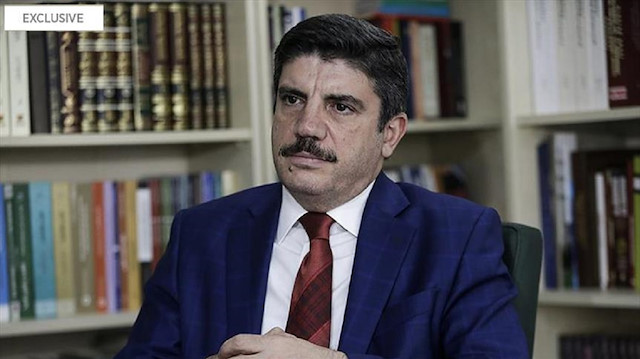

Yasin Aktay, a sociologist, advisor to Turkey’s Justice and Development (AK) Party and a friend of Khashoggi.
Though seen as opposition figure, Khashoggi did not see himself this way, says sociologist advising Turkey's ruling party
In the weeks since Jamal Khashoggi, the Washington Post columnist who entered the Saudi Consulate in Istanbul on Oct. 2 but was never heard from again, it has emerged that he was killed by private Saudi squads. Saudi officials admitted that Khashoggi was murdered.
But why was he killed? According to Yasin Aktay, a sociologist and advisor to Turkey’s ruling Justice and Development (AK) Party and a friend of Khashoggi, it was because Riyadh viewed him as someone who had the potential to organize the opposition. Though this was the role attributed to him, he had never viewed himself as such.
"Where did this suspicion [of Khashoggi] come from?” asked Aktay.
“I think that this suspicion developed out of paranoia, power, [government] paranoia, and a bit of cowardice,"
Khashoggi comes from a well-established family. With a Turkish grandfather, Muhammed Halit Kasikci, he was just one of thousands of Saudi citizens of Turkish descent. He had lived in Washington, D.C. for the last year-and-a-half and wrote columns for The Washington Post.
He had planned to officially wed Hatice Cengiz, his Turkish fiancee who was waiting for him outside the Saudi consulate on the day he was killed. His reason for visiting the consulate was to get an official document proving that he had divorced his former wife, which is needed for an official marriage.
In addition, he would frequently visit Istanbul to take part in meetings with experts and scholars to discuss solutions for the malaise the Islamic world suffers.
"Istanbul is an important center of Islamic communities and the world. Most of the meetings on the Islamic world are held in Istanbul now,” said Aktay.
“He would be invited to these meetings almost on a monthly basis. And, at these meetings with the participation of distinguished individuals, he was one of the first to come to mind."
‘Turkey as role model’
Khashoggi’s hopes grew following the winds of democracy and freedom in the wake of the 2011 Arab Spring. He wrote articles and gave speeches about the coming new era in Egypt, Libya, and Yemen. To him, the Islamic world could only overcome problems through democracy. The democratic breakthroughs and economic developments he saw in Turkey excited him. He would say that Turkey could serve as a role model for the Islamic world.
On Khashoggi's views, Aktay said: "He would state that Turkey, particularly due to its successes in development and democratization, presented a good model for the Arab world, and the Arab world would be influenced by this and make progress sooner or later. Of course, he was aware of the fact that no model could be wholly transferred anywhere, but this inspiration and influence from Turkey would echo there. For instance, during the Arab Spring, he absolutely saw that the analogy was emerging."
But Khashoggi's hopes faltered in countries where the Saudi government got involved.
"During the Arab Spring period, he took stances opposing his own country. These opposition ideas didn't turn him into a man to be silenced, really,” said Aktay.
“He was upset with the negative contributions his country made to the Arab Spring. He’s seen as an opposition journalist, but this is a title given to him over the last year-and-a-half. Before that, he had pretty good relations [with Saudi authorities].
“He wasn't looking for an alternative. I mean, he wasn't looking for a new dynasty or king. But he sought for his country to become a more democratic, better-governed kingdom like Britain. That's why he was hopeful about the reform policies declared by [King] Salman bin Abdulaziz following King Abdullah's [2015] death. He made many favorable statements."
'Trust' in Saudi Arabia
Underscoring that Khashoggi had great trust in his country, Aktay said: "He trusted that his people would not commit such an atrocity against him, he trusted Turkey. He was too confident that such an incident wouldn't take place in Turkey. He knew that there wouldn't be any sort of abduction of him in Turkey, which has a state of law and where the police force and their abilities are really good. And of course, it was a consulate. He was confident just like an ordinary man. This confidence was damaging."
Aktay added: "This is a terrible incident. Why does it mean that a person can't trust a consulate? Every person abroad has to go to their nation's consulate at some point. If these consulates turn into places where people easily commit murders and cover it up, then people will lose their trust.
“The modern world is known for its sophisticated relations of trust, isn’t it? Surely, his country had accused him of no crime. If his opposition was a crime, then the opposition has existed for ages. It is true that he sometimes opposed his country during the Arab Spring, but nobody asked him, 'Why are you in the opposition?'
“His objection to a number of arrests, the [2015] intervention in Yemen -- which he supported at the beginning -- leading to grave human rights violations, that the Saudi presence in Yemen deepened the conflict instead of solving it, were his observations. Now we all share the same observations.”
#Saudi Arabia
#Turkey
#Yasin Aktay
#Jamal Khashoggi




